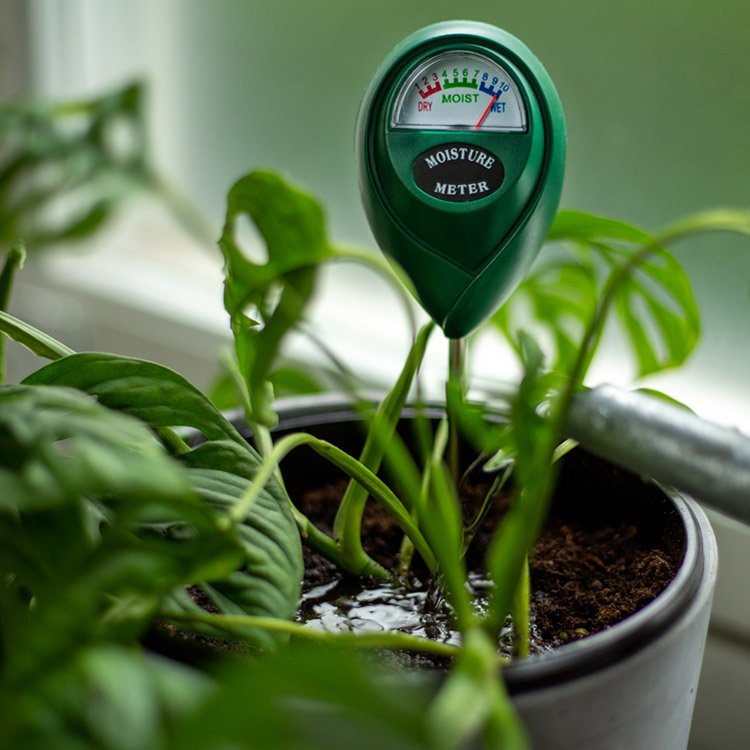The Science Behind Moisture Meters: Exactly How They Work and Why They're Vital
The Science Behind Moisture Meters: Exactly How They Work and Why They're Vital
Blog Article
The Ultimate Guide to Moisture Meters: A Comprehensive Introduction and How They Can Conserve You Cash
Moisture meters serve as essential devices in finding and monitoring moisture material in products, aiding in stopping costly problems and guaranteeing the top quality of products. Recognizing the subtleties of different kinds of wetness meters, their applications, and the prospective cost-saving benefits they use can be a game-changer for experts and businesses alike.
Sorts Of Wetness Meters
One typical type is the pin-type wetness meter, which measures the electric resistance between 2 pins put into a material. Pinless dampness meters, on the various other hand, usage electromagnetic sensor plates to scan a bigger area without triggering damages to the material's surface area.

In addition, there are additionally specialized dampness meters developed for certain products like soil, grain, or hay. These meters offer precise wetness analyses tailored to the distinct properties of the product being checked. Infrared dampness meters determine the thermal residential or commercial properties of a product to establish its dampness content non-invasively, making them useful for applications where pin or pinless meters might not be ideal. Comprehending the different kinds of dampness meters offered can assist industries choose one of the most suitable tool for their specific dampness measurement demands.

Advantages of Using Dampness Meters
Moisture meters supply invaluable benefits in properly examining and monitoring moisture degrees in varied products and atmospheres. One of the key advantages of making use of dampness meters is the prevention of prospective damages triggered by excess dampness.
Additionally, utilizing moisture meters can lead to raised power efficiency. In farming settings, moisture meters play an essential duty in enhancing plant yields by allowing farmers to monitor soil dampness degrees and make informed irrigation choices.
How to Select the Right Dampness Meter
Selecting the proper dampness meter involves thinking about key elements such as product compatibility, dimension range, and calibration accuracy. When picking a dampness meter, it's necessary to ensure that the meter appropriates for the certain product you will be testing. Different materials have varying electric buildings that can affect moisture analyses, so picking a meter made for your material is essential for exact outcomes. In addition, consider the measurement variety of the wetness meter. Make certain that the meter can detect moisture degrees within the array needed for your applications. Calibration precision is an additional vital aspect to maintain in mind. Select a dampness meter with dependable calibration to guarantee accurate and constant analyses. Some meters might need regular calibration adjustments, so understanding the calibration process is necessary. By carefully evaluating these variables, you can pick a wetness meter that satisfies your needs and gives exact wetness measurements for your projects.
Proper Strategies for Wetness Meter Use

Price Cost Savings Through Dampness Meter Applications
Exactly how can the calculated application of dampness meters lead to significant cost financial savings throughout numerous sectors? In the agriculture industry, wetness meters help in identifying the ideal time for collecting crops, preventing over-drying or excess dampness that can affect the last item's quality.
Likewise, in construction, dampness meters help stop expensive problems by spotting dampness levels in building products, such as wood or concrete, which can lead to structural concerns if not dealt with immediately. By recognizing problem locations beforehand, contractors can take rehabilitative steps to avoid extensive repairs or substitutes, inevitably saving money and time.
Furthermore, in the food processing industry, dampness meters are essential for keeping an eye on product quality and making certain compliance with safety policies. By properly determining dampness material in food items, producers can prevent spoilage, maintain quality, and lower waste, causing considerable price savings. In general, the calculated application of moisture meters is a beneficial investment that can result in considerable expense decreases and enhanced performance across different industries.
Verdict
To conclude, dampness meters are important devices for measuring and identifying wetness degrees in numerous products. By making use of the ideal moisture meter and complying with correct techniques, customers can properly protect against costly damages triggered by excess dampness. Purchasing a quality moisture meter can result in considerable expense financial savings in the future by recognizing potential issues at an early stage and allowing prompt removal. Inevitably, wetness meters are vital tools for keeping the honesty and longevity of materials and frameworks.
Dampness meters offer as vital tools in discovering and keeping an eye on moisture content in products, aiding in preventing expensive damages and guaranteeing the quality of products. Infrared wetness meters determine the thermal homes of a material to establish its moisture content non-invasively, making them beneficial for hop over to here applications where pin or pinless meters might not be ideal.Dampness meters offer vital benefits in precisely analyzing and checking dampness levels in varied materials and environments. In agricultural setups, dampness meters play a vital function in enhancing crop yields by enabling farmers to keep an eye on dirt dampness levels and make informed irrigation decisions.In verdict, wetness meters are valuable devices for identifying and gauging dampness click this levels in different materials.
Report this page